Roads

The Great Highway Squid System, New Jersey
This is an aerial image of the highway system close to Newark airport in central New Jersey. I took this on my recent flight to L.A to attend the MLA conference. That the early morning sun and the snow on the ground made everything look golden and silver at the same time is one thing, but how the roadway looks like a giant squid (with a jug handle) is quite another. It confirms my suspicion that roads are really tentacles and all the seemingly inanimate, inorganic objects that make up most of our civilization bound world are all oddly alive in a way that we will never really see or know. To figure out the sense of the one mortal life that each of us is charged with in relation to the other mortal lives around us seems overwhelming enough, to add the life of the inanimate to the list would seem all together too much. Yet, that is where literary-philosophical thought seems to be progressing.
Non-human lives and post-humanism seemed to underwrite a lot of the papers I heard at the MLA. The point there was not so much that we need to accord humanity to non-human things but that our version of the human is shaped by the inanimate, non-human, technologically animate things that we surround ourselves with. To understand ourselves we needn’t locate the center in us any longer, or start with ourselves any longer but look at the movements, affordances and appurtenances which occasion our humanity. The heliocentric universe was supposed to have dislocated the earth and its inhabitants from the false presumption of centrality in all things but the sun is too powerful a metaphor to not inhabit or give up to the margins. So the call is to decentralize, put power in the tips of the tentacles and all along its way, to know that the automotive-ants that crawl along it crawl with a kind of mechano-life that we would do well to acknowledge as our own.
Fabric

Scarves at Ten Thousand Villages
Yesterday’s snow walk through Highland Park was largely on the Main Street since the local businesses had made it a point to have the sidewalks shoveled. We walked into Ten Thousand Villages to ogle their collection of beautiful and unaffordable handicraft from around the world. I was admiring this set of scarves. The fabric looked warm and felt soft to the touch. To think that they are but warp and weft of proteins and fiber, but so is everything else.
Everything that is made up is fabric. In its earliest use the word fabric meant building or edifice. It also denoted the skill and contrivance to produce artifice. In a famous speech in The Tempest, Shakespeare’s Prospero’s likens the great globe itself to the baseless fabric of his vision that will dissolve, fade and leave not a rack behind. The baselessness of the fabric indicates Prospero’s moment of great despair in products of human endeavor that are ultimately insubstantial. This may have had a bigger etymological impact than we realize on the current day usage of fabric as verb. Now, the only context in which fabricating is used to indicate manufacture is lies. Lies, in essence, are insubstantial. In fact, Shakespeare hones in on exactly this sense of the usage in The Winter’s Tale when Camillo the counselor finds himself unable to shake the fabric of the king’s folly. As a jealous husband and a powerful king, Leontes’ fabric of folly is grand and held upright by a foundation of faith *. In this instance, Shakespeare brings together fabric as edifice with the fabrication of folly. That the notion of building and manufacturing should be etymologically and philosophically linked to the idea of folly is not so surprising; it is a reminder that all things manufactured are ultimately subject to time and decay. In this sense, folly is the foolishness of presumption or a matter of false faith. Prospero realizes this and Camillo finds that Leontes does not. In the modern usage fabrication is folly and severed from the idea of useful productivity. The industrial revolution took better care of allaying our misgivings about how much we can manufacture and how long we may presume for it to last.
While the verb has come to exclusively denote falsehood, the noun largely only refers to cloth or textile. This attribution of meaning dates back to the eighteenth century when textile turned the engine of industry along with iron founding. Cloth became the synecdoche for fabric and fabric has become the metaphor for life.
*
Swear his thought over
By each particular star in heaven and
By all their influences, you may as well
Forbid the sea for to obey the moon
As or by oath remove or counsel shake
The fabric of his folly, whose foundation
Is piled upon his faith and will continue
The standing of his body.
